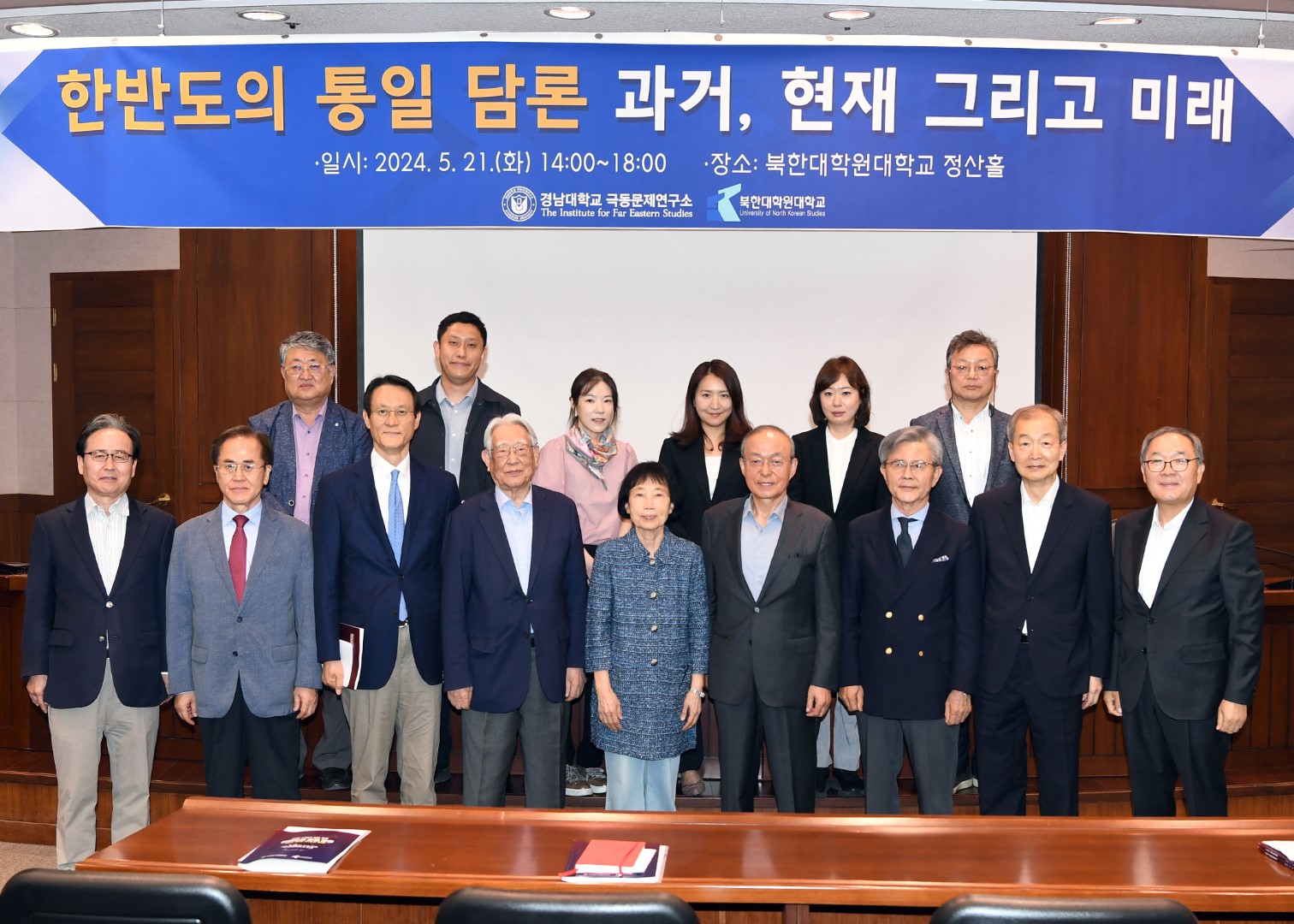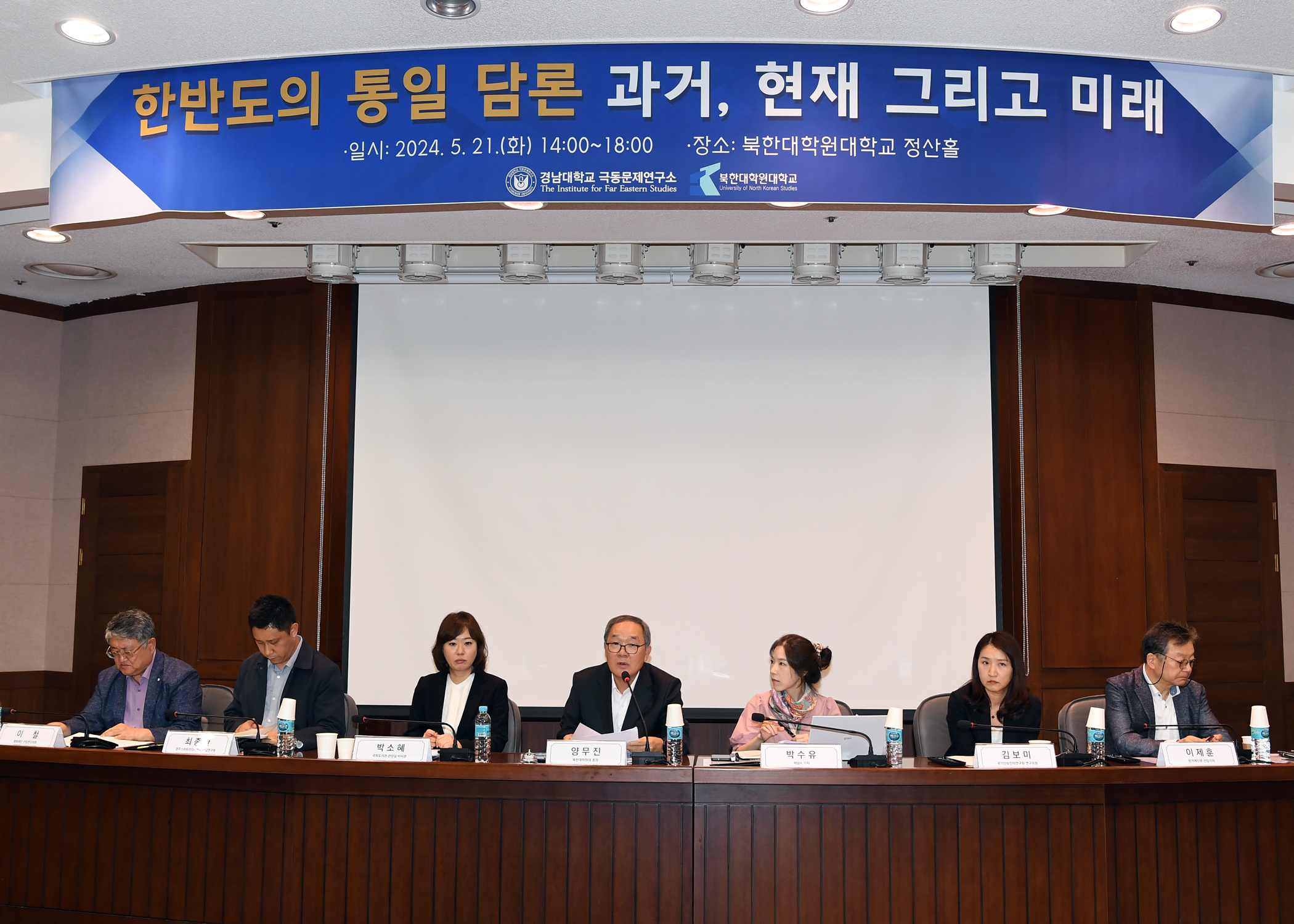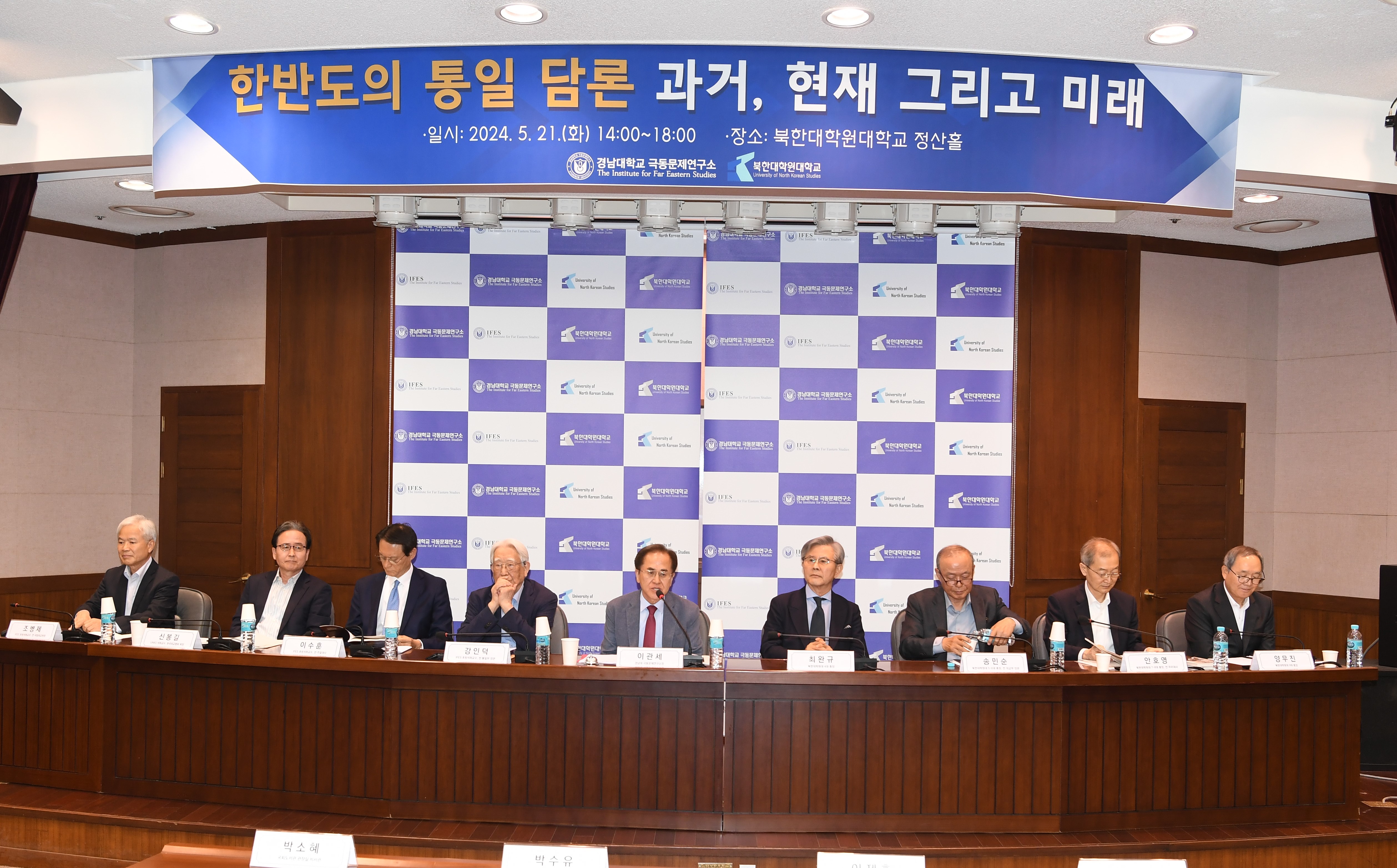
.jpg)
The Institute for Far Eastern Studies, Kyungnam University (Director Lee Kwan-Sei) and University of North Korean Studies (President Yang Moo-Jin) held a joint conference on May 21 (Tuesday) at Jeongsan Hall entitled ‘Discourses of Unification on the Korean Peninsula: Past, Present, and Future.’

The first session, "Korean Peninsula Reunification: Discourse and Reality," featured a panel of University of North Korean Studies’ graduates: speakers Park So-hye (Secretary to the Director of the National Assembly Library) and Park Sooyoo (reporter for Channel A), along with panelists Choi Jong-hwan (senior researcher at the Gyeongju Smart Media Center), Lee Chul (senior research fellow at the Peace Foundation), Kim Bomi (research fellow at the Institute for National Security Strategy), and Lee Je-hun (senior reporter at the Hankyoreh).
In her presentation, "Analyzing North Korea's Two State Declarations: Focusing on the Changes in North Korea's Concept of Nation and Unification," Park So-hye analyzed that, from the perspective of maintenance of the North Korean regime, "North Korea's declaration of 'nation' is the result of a judgment [in North Korea] that the word 'nation' defining North Korea independently is more advantageous than 'nation' or 'unification' encompassing South Korea." She said that "there is a possibility that North Korea will invoke 'unification' after achieving its national goals. Regarding the 'Formation and Transformation of Unification Discourse in South Korea,' panelist Choi Jong-hwan said, "It is necessary to maintain a unification policy that is easily understood by and practicable to the people, and cultural exchanges using content are needed for the MZ generation, who are familiar with online spaces, and defectors and elderly people who have not forgotten their unification sensibilities." In terms of 'unification and peace discourse,' Lee Chul emphasized that "the possibility of inter-Korean dialogue has become very low, but it is important to continue to create conditions where North Korea needs and is willing to engage in dialogue."
Speaking on 'Prospects for a New Unification Initiative: Issues and Conditions,' Park Sooyoo argued that "the current unification plan requires a peaceful and phased methodology that is linked to denuclearization and detailed at each step," and that "the nature of the concept of nation, which has been limited to one nation by blood, should be redefined based on ethnic commonality rather than ethnic homogeneity." In a discussion on 'North Korea's escalating nuclear arsenal and the risk of armed unification,' Kim Bomi said, "Despite North Korea's reversal of course and continued armed provocations, the likelihood of armed unification by North Korea is unlikely," and predicted that "the likelihood of accidental nuclear use will continue to increase in the context of the North-South confrontation." According to Lee Je-hun, "The sustainability of Kim Jong Un's new course is far from certain." He characterized the current situation as "an unprecedented 'protruding situation' in the history of the Korean Peninsula in that North Korea is openly pursuing total disconnection of the two Koreas."

The second session, "The Changing Situation on the Korean Peninsula and the Unification Discourse," featured in-depth discussions with former presidents and professors of the University of North Korean Studies, as well as a visiting professor at the Institute for Far Eastern Studies, Kyungnam University.
Speaking on 'Coexistence between North and South Korea, Its Limits and Possibilities,' Dr. Choi Wan-Kyu (former President of UNKS) said, "If North Korea overcomes the crisis, develops its economy, and appears as a normal country in the international community, inter-Korean relations may revert to political confrontation as in the past." He went on to say that "True peaceful coexistence between North and South Korea must be predicated on the transformation of the North Korean system." However, according to Amb. Song Minsoon (former ROK foreign minister and former President of UNKS) in his talk on 'The Security Structure, Nuclear Balance and Unification of the Korean Peninsula, "The difficulty in promoting the unification policy is due to the contradictory phenomenon that the main actors in the balance of forces for stability and peace on the Korean Peninsula are not 'North and South' but 'the United States and North Korea.'" Commenting on '2024 U.S. Presidential Election Scenario and Our Security,' Amb. Ahn Ho-Young (former ROK ambassador to the US and former President of UNKS) said, "The fact that there are various voices on the North Korean nuclear issue even among the Trump campaign's closest associates is due to the fact that the North Korean nuclear issue is so important and has not found a clear solution, so Korea should be fully prepared and take the center and lead." Speaking on "North Korea's Two Hostile States Theory and Inter-Korean Relations," Yang Moo-Jin (current President of UNKS) stated that "North Korea's hostile state definition and escalation of threats are ultimately aimed at the United States. . . . North Korea is pursuing a 'new chain state policy' to antagonize and isolate itself in order to maintain its regime. . . . A peace settlement is possible only if Kim Jong-Un's regime is brought to a soft landing through denuclearization, strong national defense, and four-way talks."
In the general discussion that followed, Amb. Lee Su-Hoon (former ROK ambassador to Japan and currently Visiting Professor at IFES) explained that "the starting point of South Korea's foreign policy strategy should be to uphold the 'constitutional mission' of 'peaceful reunification of the homeland' through inter-Korean relations," that "denuclearization of the Korean Peninsula is an unattainable goal," and that "Japan's cooperation should be induced based on mature bilateral relations." Following his remarks, Amb. Shin Bong-kil (former ROK ambassador to India and Distinguished Professor at UNKS) emphasized that "North Korea's hostile two-state theory is a position of coexistence for the purpose of relieving the anxiety of unilateral absorption unification by the South." He further stated that "it is necessary to secure the current 'ethnic community unification plan' and promote an EU-style functionalist integration plan for the two Koreas." Finally, Cho Byung-Jae (Visiting Scholar at IFES and former chancellor of the Korea National Diplomatic Academy) commented that "For Trump, the 'Hanoi No Deal' is not a failure, but only a poor negotiation, and resumption of talks with North Korea will be a matter of timing if he is re-elected." He added that "South Korea needs to be flexible and prepared for various scenarios."
In closing, President Yang Moo-Jin and Director Lee Kwan-Sei remarked that the conference was a meaningful opportunity to analyze the unification discourse on the Korean Peninsula and suggest a new direction for the unification discourse in light of North Korean leader Kim Jong Un's announcement (in late December last year at the Workers' Party of Korea (WPK) Plenum and the Supreme People's Assembly) that he has fundamentally changed his policy toward the South, defining the relationship between the two Koreas as a belligerent state at war. In particular, they stressed that the situation on the Korean Peninsula will be very fluid depending on the outcome of the US presidential election this November, and that it is imperative that South Korea prepare thoroughly and take strategic measures to deal with the complex factors.